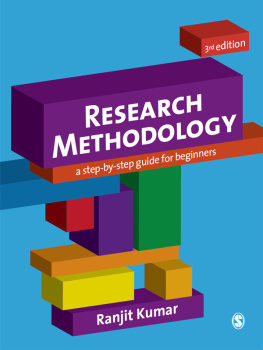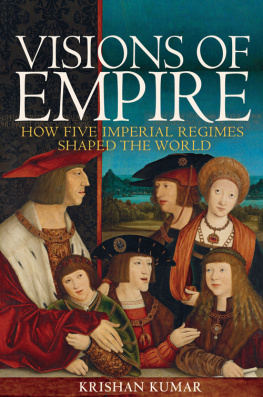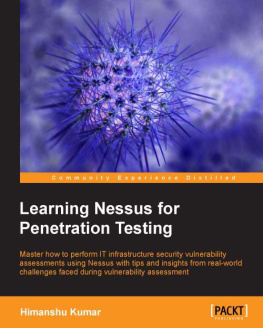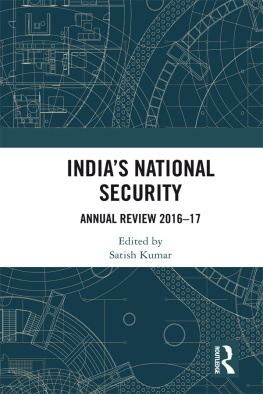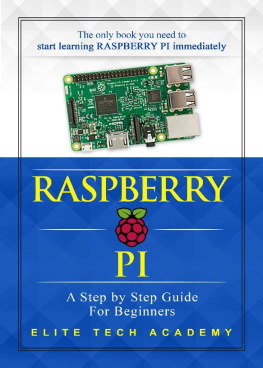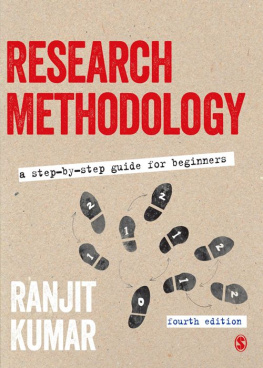Kumar - Research methodology: a step-by-step guide for beginners
Here you can read online Kumar - Research methodology: a step-by-step guide for beginners full text of the book (entire story) in english for free. Download pdf and epub, get meaning, cover and reviews about this ebook. City: Los Angeles, year: 2012;2011, publisher: SAGE Publications, genre: Politics. Description of the work, (preface) as well as reviews are available. Best literature library LitArk.com created for fans of good reading and offers a wide selection of genres:
Romance novel
Science fiction
Adventure
Detective
Science
History
Home and family
Prose
Art
Politics
Computer
Non-fiction
Religion
Business
Children
Humor
Choose a favorite category and find really read worthwhile books. Enjoy immersion in the world of imagination, feel the emotions of the characters or learn something new for yourself, make an fascinating discovery.
Research methodology: a step-by-step guide for beginners: summary, description and annotation
We offer to read an annotation, description, summary or preface (depends on what the author of the book "Research methodology: a step-by-step guide for beginners" wrote himself). If you haven't found the necessary information about the book — write in the comments, we will try to find it.
Kumar: author's other books
Who wrote Research methodology: a step-by-step guide for beginners? Find out the surname, the name of the author of the book and a list of all author's works by series.
Research methodology: a step-by-step guide for beginners — read online for free the complete book (whole text) full work
Below is the text of the book, divided by pages. System saving the place of the last page read, allows you to conveniently read the book "Research methodology: a step-by-step guide for beginners" online for free, without having to search again every time where you left off. Put a bookmark, and you can go to the page where you finished reading at any time.
Font size:
Interval:
Bookmark:
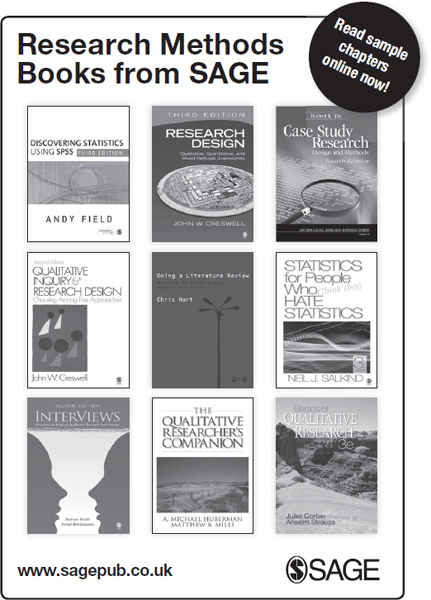
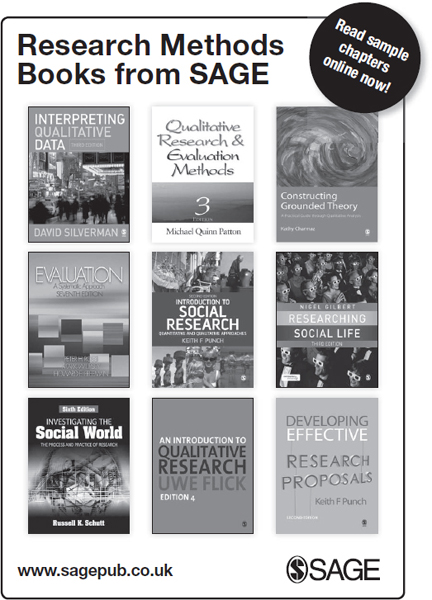
Application is the essence of knowledge. However, there always remains a gap between theoretical knowledge and its application. It is only with practice that this gap can be narrowed. A beginner attempting to apply theoretical knowledge needs direction and guidance. This set of exercises has been developed with this belief. There is an exercise for almost each operational step of the proposed research process. Working through them will help you to develop a research project.
The main aim of these exercises is to provide you with a broad framework that is central to the operationalisation of each step of the research process. In most cases, a separate exercise is provided for quantitative and qualitative studies so it is important that you know before you start which approach you are going to take. Within each exercise, there are brief reminders of some of the key issues relating to the process and a series of questions to help you to think through procedures and provide a framework for the development of your study.
Answers to these questions and awareness of the issues that the exercises outline will put you in a position to complete the framework suggested for writing a research proposal (), and therefore these will also constitute the core of your research proposal.
It is important for a beginner to work through these exercises with considerable thought and care.
Now that you have gone through all the chapters that constitute Step I of the research process, this exercise provides you with an opportunity to apply that knowledge to formulate a research problem that is of interest to you. As you know, selecting a research problem is one of the most important aspects of social research, so this exercise will, therefore, help you in formulating your research problem by raising questions and issues that will guide you to examine critically various facets and implications of what you are proposing to study. The exercise is designed to provide a directional framework that guides you through the problem formulation path. Keep in mind that the questions and issues raised in this exercise are not prescriptive but indicative and directional, hence you need to be critical and innovative while working through them. Thinking through a research problem with care can prevent a tremendous wastage of human and financial resources.
A research problem should be clearly stated and be specific in nature. The feasibility of the study in terms of the availability of technical expertise, finances and time, and in terms of its relevance, should be considered thoroughly at the problem-formulation stage. In studies that attempt to establish a causal relationship or an association, the accuracy of the measurement of independent (cause) and dependent (effect) variables is of crucial importance and, hence, should be given serious consideration. If you have already selected a problem, you need not go through this process.
Start by identifying a broad area you are interested in. For example, a health, education or treatment programme; migration; patient care; community health; community needs; foster care; or the relationship between unemployment and street crime. of this book will help you to work through this exercise.
Step I | Select a broad area of study that interests you from within your academic discipline. |
Having selected an area, the next step is to dissect it in order to identify its various aspects and subareas. For example, say your broad area of interest is migration. Some aspects or subareas of migration are:
- a socioeconomicdemographic profile of immigrants;
- reasons for immigration;
- problems of immigrants;
- services provided to immigrants;
- attitudes of immigrants towards migration;
- attitudes of host communities towards immigrants;
- the extent of acculturation and assimilation;
- racial discrimination in the host country.
Or perhaps you are interested in studying a public health programme. Dissect it as finely as possible in order to identify the aspects that could be studied. List them as they come to you. For example:
- a socioeconomicdemographic profile of the target group;
- the morbidity and mortality patterns in a community;
- the extent and nature of programme utilisation;
- the effects of a programme on a community;
- the effectiveness of a particular health promotion strategy.
Or your interest may be in studying delinquents. Some aspects of delinquency are:
- delinquency as related to unemployment, broken homes or urbanisation;
- a profile of delinquents;
- reasons for delinquency;
- various therapeutic strategies.
Step II | Dissect the broad area that you selected in Step I into subareas as discretely and finely as possible. Have a one-person (with yourself) brainstorming session. |
- ____________________
- ____________________
- ____________________
- ____________________
- ____________________
To investigate all these subareas is neither advisable nor feasible. Select only those subareas that would be possible for you to study within the constraints of time, finance and expertise at your disposal. One way to select your subarea is to start with a process of elimination: delete those areas you are not very interested in. Towards the end it may become difficult but you need to keep eliminating until you have selected a subarea(s) that can be managed within your constraints. Even one subarea can provide you with a valid and exhaustive study.
Step III | From the above subareas, select a subarea or subareas in which you would like to conduct your study. |
- ____________________
- ____________________
- ____________________
Step IV | Within each chosen subarea, what research questions do you hope to answer? (Be as specific as possible. You can select one or as many subareas as you want.) |
Subarea Specific research questions to be answered
(a) __________ | |
(b) __________ | |
(c) __________ | |
(d) __________ | |
(e) __________ |
Subarea Specific research questions to be answered
(a) __________ | |
(b) __________ | |
(c) __________ | |
(d) __________ | |
(e) __________ | |
(a) __________ | |
(b) __________ | |
(c) __________ | |
(d) __________ | |
(e) __________ |
The research questions to be answered through the study become the basis of your objectives. Use action-oriented words in the formulation of objectives. The main difference between research questions and objectives is the way they are written. Questions are worded in question form and objectives are statements referring to the achievement of a task.
Next pageFont size:
Interval:
Bookmark:
Similar books «Research methodology: a step-by-step guide for beginners»
Look at similar books to Research methodology: a step-by-step guide for beginners. We have selected literature similar in name and meaning in the hope of providing readers with more options to find new, interesting, not yet read works.
Discussion, reviews of the book Research methodology: a step-by-step guide for beginners and just readers' own opinions. Leave your comments, write what you think about the work, its meaning or the main characters. Specify what exactly you liked and what you didn't like, and why you think so.

